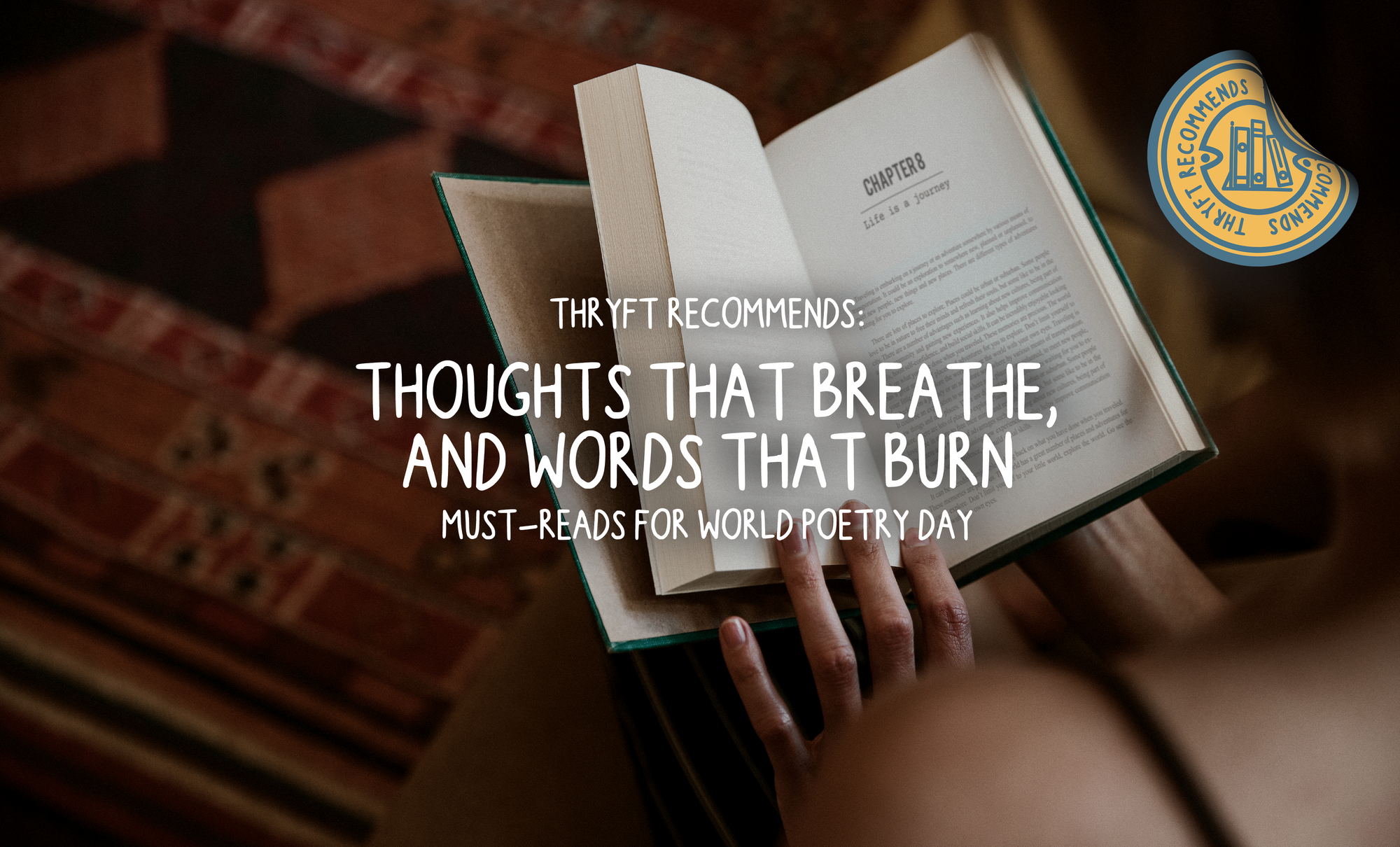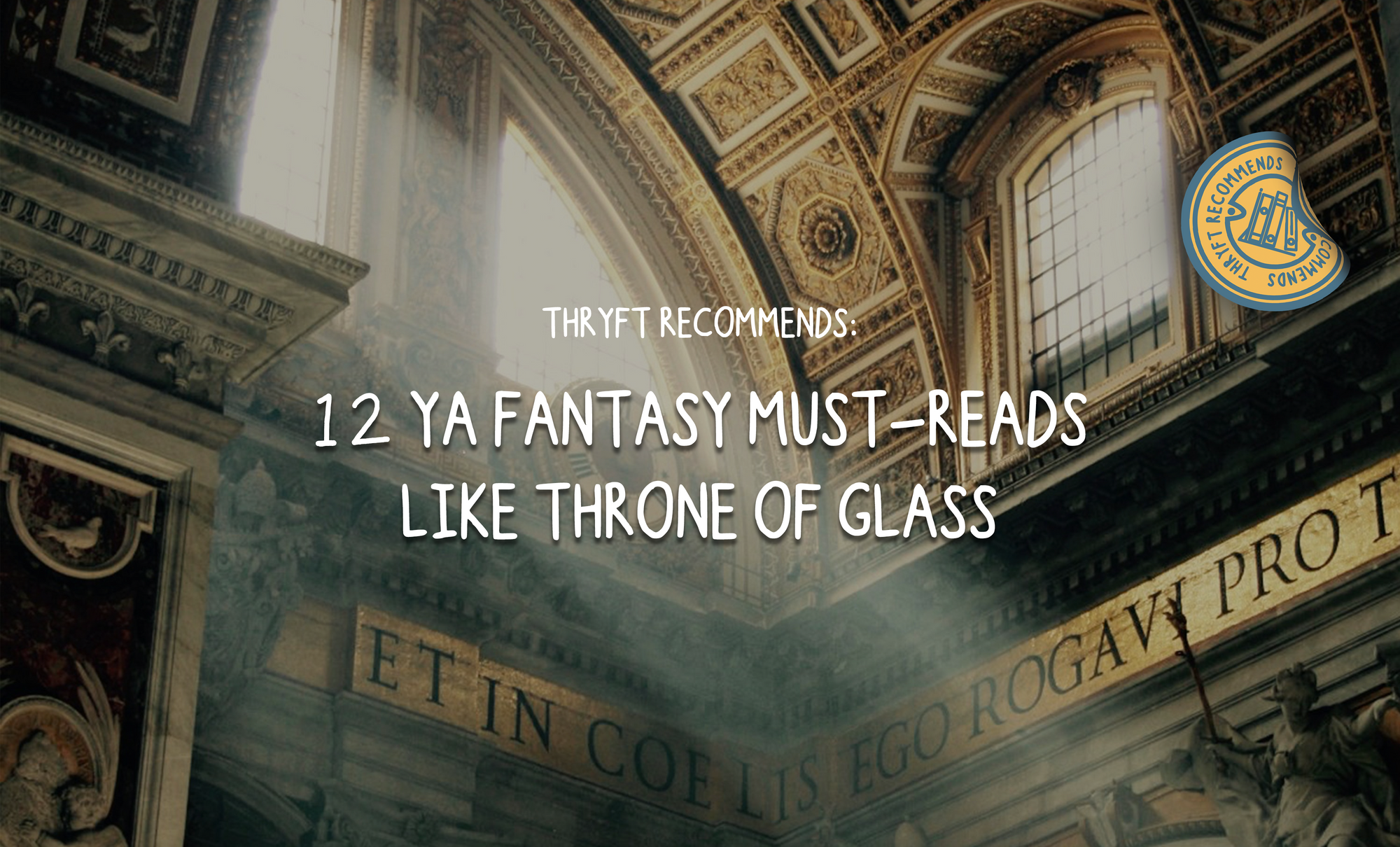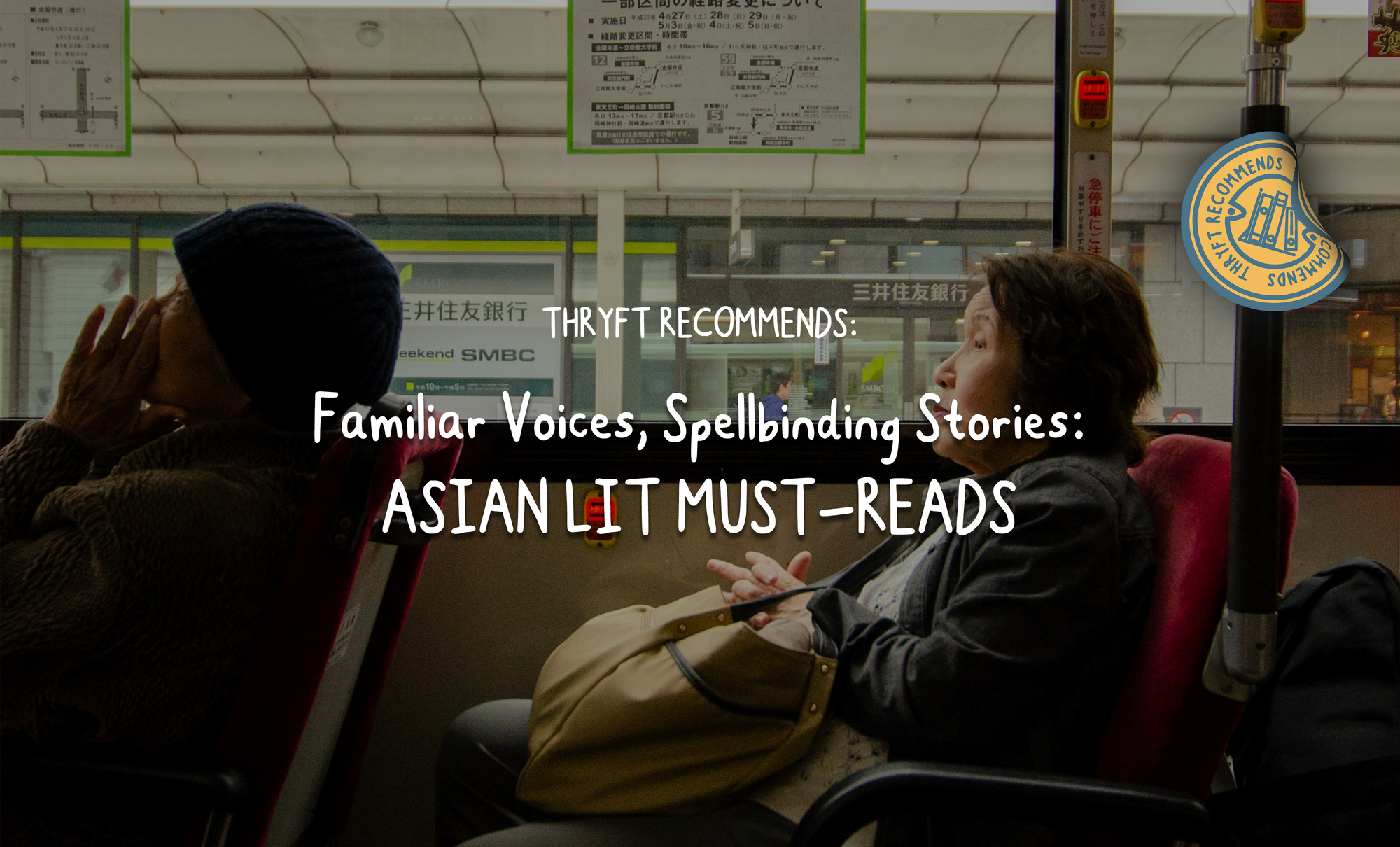Poetry is no doubt one of the earliest art forms that have emerged from language, and it remains with us even today. That’s more than 2 millennia’s worth of histories, traditions, and poems! Regardless of where you are in the world, it is arguably an important foundation to all modern literature and stories.
But where do we start, and how do we begin to understand and appreciate poetry, which can sometimes seem more like riddles that make little sense? Fret not - for we have gathered a list of titles to get you acquainted with the skills and contexts needed to interpret these works. In light of the upcoming annual World Poetry Day (21 March), let’s also dive into some of the most renowned poetry collections from both the Western tradition and others across the world.
Browse by Category:
1. Western Classics
2. The World Canon
3. Literary Criticism
Western Classics
Speaking broadly about poetry, the first works that come to your mind may very well be poems and poets from the European and American traditions. And for good reason - some of these poems have become iconic and even representative of the entire Western tradition of literature. Here are some that you mustn't miss:
The Complete Works of William Shakespeare
By William Shakespeare

Where else to start but Shakespeare? The most recognised English writer of all time, William Shakespeare is perhaps better known for his plays such as Hamlet and Romeo and Juliet, but his sonnets definitely deserve attention as well. Mostly about love, Shakespeare's sonnets seem to reveal a different side to him - one that was more passionate, emotional, and beautifully lyrical.
And this rare vintage copy of The Complete Works of Shakespeare contains all 154 of his sonnets, along with the additional ones written in some of his plays. Edited by the late Professor Peter Alexander, this edition has long been established as one of the most authoritative editions of Shakespeare’s works, and was even chosen by the BBC as the basis for its televised cycle of the plays. The book includes two specially written articles - a biography and a wide-ranging introduction to Shakespearean theatre. Each play is also introduced by academics from Glasgow University, where Professor Alexander undertook his editing.
The Riverside Chaucer
By Geoffrey Chaucer

Before Shakespeare, there was Geoffrey Chaucer, who has been regarded as the "father of English literature and poetry" for his vital role in legitimising Middle English (predecessor to Modern English) usage for literary works during a time when Latin and Anglo-Norman French were still the dominant languages.
The Riverside Chaucer presents the most authentic and complete collection of Chaucer's poems, including his satirical masterpiece, The Canterbury Tales, featuring a group of pilgrims from all parts of society engaged in a storytelling contest en route to the shrine of St. Thomas Becket at Canterbury Cathedral. The definitive third edition comes with a brand new foreword by Johns Hopkins Professor Christopher Cannon, a detailed introduction on Chaucer's life and works, on-the-page glosses, and expanded explanatory notes, textual notes, bibliography, and glossary.
The Works of John Clare
By John Clare

John Clare has been called the one of the foremost "peasant poets" of the English language and "the quintessential Romantic poet". Born the son of a farm labourer during a period of massive change (thanks to the Industrial Revolution), Clare received only limited formal education, but it did not stop him from penning numerous poems and prose pieces, which became widely read after his death.
The Works of John Clare features some of his most gorgeously written poems, such as "All Nature Has a Feeling", "I Am", and "Autumn". His early works show a fascination with the countryside, nature, the seasons and their changing moods, rural childhood, and love, while his later works became more distinctive in voice as he grappled with an increasingly alienated and unstable self.
Songs of Innocence and Experience
By William Blake

William Blake was quite the triple threat - being one of the finest poets, painters, and printmakers of his time, for whom art and poetry were inextricably linked. He was an independent and rebellious thinker (to the point of being considered idiosyncratic by his contemporaries), who abhorred pretense and falsity in others. His "Songs of Innocence" are products of this innocent imagination untainted by worldliness, while the "Songs of Experience" are resulted from his feelings of indignation and pity for the sufferings of mankind.
The Songs of Innocence and Experience, containing some of Blake's finest and best-loved poems, are presented here in the form which best satisfied the high expectations of his poetic and artistic aspirations. The 54 plates which Blake originally etched and coloured by hand are faithfully reproduced with the same delicacy and dimensions as the artist created them, to accompany the words that he had conjured.
Selected Poems of Gerard Manley Hopkins
By Gerard Manley Hopkins

Gerard Manley Hopkins is among the greatest Victorian Era poets (and a Jesuit priest in his later life) whose work combined awareness of material sensuousness with the asceticism of religious devotion. His collected poems, published only posthumously due to the radically different style from his contemporaries, came to exercise a profound influence on modern poetry.
Selected Poems feature all of Hopkins's mature work, offering a sampler of the poet's striking originality, intellectual depth, and perceptive vision. They include his well-known elegy, "The Wreck of the Deutschland", "God's Grandeur", "Hurrahing in Harvest", "The Windhover", "Pied Beauty", and "Carrion Comfort".
The World Canon
Having long been the centre and the source of intensive discussion, debates, and even movements about the artistic potential and merits of language in literature, it is no wonder that poetry from the Western world has gained worldwide recognition.
Nonetheless, the art of language and poetry is not exclusive to them. All around the world, there have been many great epics and poems written across different time periods, by both men and women alike. Here are some of the most lauded and timeless works:
The Pillow Book of Sei Shōnagon
By Sei Shōnagon

Written by Sei Shōnagon, a lady of the court at the height of the Heian period, The Pillow Book enthralls with its passionate and lively gossip, witty observations, and subtle impressions about life during medieval Japan's golden age. Featuring reflections on royal and religious ceremonies, nature, conversation, poetry, and many other subjects, it offers an intimate perspective into the experiences and outlook of the Heian upper class, further enriched by translator and editor Ivan Morris' extensive notes and critical contextualisation.
Shōnagon's work has since gone on to become a classic, even being frequently compared with Murasaki Shikibu's The Tale of Genji, another legendary work of her time which has been called the world's first novel.
Rāmāyana Book Three: The Forest
By Valmiki

The Rāmāyana is undoubtedly one of the largest and most important epics in ancient world literature, especially to the South Asian and Southeast Asian regions, where it has even been associated with the major religious and cultural festival of Diwali / Deepavali. The long epic poem's significance in these parts if the world is comparable to that of the famous Homerian Greek epics The Iliad and The Odyssey.
The epic narrates the life of the legendary prince Rama of Ayodhya, his life in exile, his martial exploits, and his eventual return. In Book Three: The Forest, things seem increasingly dangerous as the exiled prince and his beloved Sita (along with her brother) took refuge in forest hermitages, for one demon after another attempts to harm or corrupt them, but each time Rama again defeats them. Finally Ravana, the supreme lord of the demons, decides to cripple Rama by capturing Sita. Rama is distraught by grief, and searches everywhere without success.
I Heard God Laughing
By Shirazi Hafiz

"A poet is someone who can pour Light into a spoon, then raise it to nourish your beautiful parched, holy mouth."
I Heard God Laughing is a collection of hopeful and joyous poems by the great Persian lyric poet and mystic, Hafiz (also known as Hafez). To Persians - now Iranians - these divinely-inspired poems are not "classical literature" from a remote past, but cherished wisdom from a dear and intimate friend that continues to be quoted in daily life as proverbs.
With uncanny insight, Hafiz captures the many forms and stages of love with his spiritual poetry, which outlines the stages of the mystic's "path of love" - a journey in which love dissolves personal boundaries and limitations to unite with larger processes of growth and transformation.
Therīgāthā: Poems of the First Buddhist Women
Translated by Charles Hallisey

The Therīgāthā, composed more than 2 millennia ago, is an anthology of poems in the Pali language by and about some of the first Buddhist women, known as therīs. The poems they left behind are arguably among the earliest and oldest surviving examples of women’s writing in the world and they are unmatched for their quality of personal expression and the extraordinary insight they offer into the lives of women in the ancient Indian past.
This new version, based on a careful reassessment of the major editions of the work and printed in the Roman script common for modern editions of Pali texts, offers the most powerful and the most readable translation ever achieved in English, and is bound to continue resonating with modern readers.
Literary Criticism
Don’t worry - “criticism” here doesn’t mean labelling bad poems. What literary criticism really means is interpreting and making sense of literature (including poetry) through its usage of literary techniques, and broader, external influences in the form of intellectual movements, historical context, philosophy, and more.
Unlike how we communicate in everyday life (full of slangs, abbreviations, coupled with body language), poetry tends to be more obscure and indirect. Its goal is not to facilitate quick and easy understanding of ideas, but to confront us with different manners of expressing ourselves such that our minds become more open to the flexibility of language.
This is why, with knowledge of the right context and literary devices, we can better understand what each poet is trying to achieve in their poems and in turn, better appreciate them. Though, as you will see in some of these titles below, there is no single approach to doing so, and methods of literary criticism have certainly changed over years and centuries.
Thinking About Texts
By Chris Hopkins

Thinking About Texts is a wonderful avenue to get more accustomed to close reading your favourite poems. This introductory textbook is based on the premise that first encounters with contemporary literary theory are often baffling. It aims to help you develop advanced skills in reading texts, and the ability to think in sophisticated ways about the conditions and concepts which surround and define interpretation English Literature.
Designed to bridge the gap between the ability to read texts and the ability to apply critical theory, this book expands understanding of 5 key issues, using diverse textual examples, interactive exercises, and discussion of possible answers and their consequences.
Revaluation: Tradition and Development in English Poetry
By F. R. Leavis

The 1936 publishing of Revulation: Tradition and Development in English Poetry quickly made F.R. Leavis one of the most influential literary critics during the mid-20th century. While his theories have become outdated with the rise of postmodernism, they are nonetheless important for those keen to understand the history of literary criticism. Leavis' stance is notable for claiming that literature as a discipline should closely relate to real life and that thus works must be assessed based on the moral positions of the writer and society.
This rare vintage edition surveys a vast swath of English poetry dating back to the 17th century. It is known for putting the Metaphysical style poets like Donne on the pedestal while showing skepticism towards Milton, and for offering a complex treatment of the Romantics like Wordsworth, Shelley, and Keats.
John Milton
By Annabel M. Patterson

Milton, as seen dealt with by Leavis' work above and scores of other critics, is widely known in the literary scene for his epic poem Paradise Lost, one of the greatest works of literature written. It is hence no wonder that he is studied by all students of English literature at some point.
This volume on John Milton demonstrates literary criticism in action. It is a collection of the best, most recent critical works on Milton. The essays cover all stages of his career, from the early poems (L'Allegro and Lycidas) through to the later poems of the Restoration period (Paradise Lost). Important viewpoints are obtained from both British and American scholars, and is inclusive of approaches ranging from new criticism, deconstruction, Marxist criticism, to feminist criticism. Perfect for both undergraduate and postgraduate students, i.e. suitable for both beginners to the field and advanced scholars.
John Donne
By Andrew Mousley

Donne is the representative poet studied for those interested in poems characterised by philosophical musings, ordinary language, unexpected smiles and metaphors, irony, and metrically flexible lines. He is known for sonnets, love poems, religious poems, Latin translation works, elegies, sermons, and more.
This new collection of essays on John Donne offers you another glance at how literary criticism works. Recently influential critical methods of historicism, feminism, psychoanalysis, and deconstruction are employed to explore Donne's ambivalent relationship with language, women, love, self, God, and society. Both old and new approaches are represented so that they may illuminate and interrogate each other. The introduction even highlights some of the key differences and continuities between old and new versions of literary criticism, exploring the ideas and assumptions underlying each and then offering insights into Donne in relation to them.
The Discovery of Poetry: A Field Guide to Reading and Writing Poems
By Frances Mayes

Now that you have seen how to read and understand poems, how about taking these efforts further and learn how to write your own magnum opus?
After publishing 5 books of poetry and teaching creative writing for more than 25 years, Frances Mayes is no stranger to the subject. In The Discovery of Poetry, she brings her passion and expertise out of the classroom and into the homes of everyday reader. Beginning with basic terminology and techniques, from texture and sound to rhyme and repetition, Mayes shows how focusing on one aspect of a poem can help you to better understand, appreciate, and enjoy the reading and writing experience. On top of the many creative and helpful composition ideas, following each lyrical and lively discussion is a thoughtful selection of poems. This is a wonderful and accessible field guide to what Mayes calls "the natural pleasures of language - a happiness we were born to have".
If you are a poetry lover, we hope these titles can help you take your knowledge and your craft (if you write!) to the next level. If you are a casual reader of poems, we hope that you have found your next anthology to muse over.
Keen to see more of our collection? Simply click on the button below to access it. Be sure to quickly check out those that have caught your eye, for we are offering you a Buy 2 Get 1 Free sitewide promotion from now until the end of Sunday - and stocks are running out fast!






